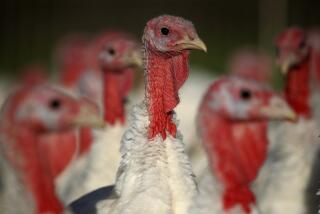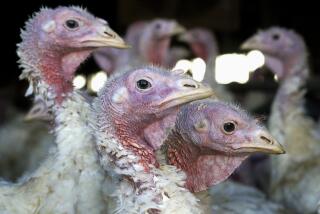At Butterball U., They Love to Talk Turkey : Home Economists Operate Hot Line Providing Help for âTurkey Traumaâ
The telephone rings at Butterball U. and the first words the operator usually hears are, âYouâre not going to believe this, but . . . .â
But the Turkey Talkers probably have heard it before. Theyâve been giving advice and saving anxious cooks from âturkey traumaâ for the past seven years.
The group of 48 home economists operate a toll-free hot line now through Dec. 24, answering questions ranging from how to defrost a turkey to what to do with leftovers.
âWeâve Come a Long Wayâ
âThere were only six of us at the beginning,â said hot-line director Jean Schnelle in a telephone interview from Chicago. âWe almost burned out the phone wires that year. Weâve come a long way since then. People depend on us. Weâre part of the Thanksgiving tradition.â
Before the hot line opens up for business, Turkey Talkers get a two-day training session with lessons on telephone technique, food safety, a notebook crammed with turkey-related tips and time in the test kitchen, said Schnelle.
âWe roast turkeys in a variety of methods to see which ones yield the best-looking turkey,â she said. âWe will see what works and make recommendations on the basis of that experience.â
Last year, the hot line took calls from 58,000 people, with 6,200 alone on Thanksgiving Day, said Schnelle.
âOn Thanksgiving morning, we get the sense of seeing all these ovens all over the country and all these people standing over them, flushed and distressed,â she said.
A lot of calls are from cooks who suddenly find themselves in charge of the big bird.
âWe have so many people calling us and say, âThis is the first time Iâve done a turkey and Iâm embarrassed to ask someone how to do this,â â said Schnelle. âTheyâve had Thanksgiving dinner at someone elseâs house for years, and that someone has moved and now theyâre the hostess.â
Basic queries include âWhat size turkey should I buy?â to such comments as âI didnât know I had to thaw this thing,â she said, and sometimes the confusion stems from how theyâve seen it done throughout the years.
âUsing steel pins used to be a big deal but most turkeys these days have a flap of skin (to keep moisture in) so those arenât needed anymore,â said Schnelle. âWe get people saying, âBut my grandmother did it that way.â
âWe donât even recommend using a covered roaster. Our favorite method is using an uncovered pan with high enough sides with the turkey on a little rack. A meat thermometer is also good to have.â
Carving a turkey also seems to be a practice cloaked in secret ritual but actually is fairly simple, said Schnelle.
âA turkey will taste just as good no matter how itâs cut up,â she said. âOne operator got a call on Thanksgiving Day from a man who phoned from the dinner table, saying, âOK, itâs in front of me, Iâve got the knife in my hand, now what do I do?â â
An increasing number of calls come from immigrant families, said Schnelle, eager to take part in this most American of holidays.
âOne of the operators one day found herself describing what cranberries and bread cubes were,â she said. âIt was a new family from the Orient and they wanted to do everything typically American.
âIt seems no matter what the nationality is, you get a sense that this is one time a year everyone does the same thing--cook a turkey.â
Concerned cooks may call the Turkey Talkers hot line at (800) 323-4848 from 6 a.m to 6 p.m. PST now and from 6 a.m. to 4 p.m. the weekends of Nov. 14-15, Nov. 21-22 and Christmas Eve. On Thanksgiving Day, the hot line will be open from 4 a.m to 4 p.m.
Callers may receive a free booklet containing recipes for leftovers upon request.
More to Read
Sign up for Essential California
The most important California stories and recommendations in your inbox every morning.
You may occasionally receive promotional content from the Los Angeles Times.










